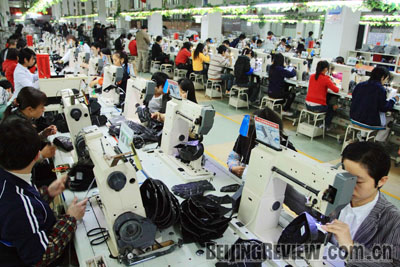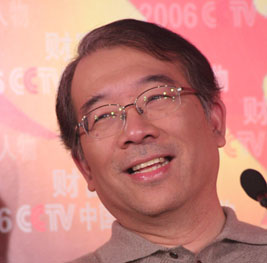| 
STRUGGLE FOR SURVIVAL: Small export-oriented companies are having a hard time
as China sticks to a tight monetary policy. This photo shows employees
working in a garment factory in Quanzhou in southeastern Fujian Province
China's consumer price index (CPI) continued to rise, but has slowed down since March. Although the country's producer price index (PPI) scored new highs for months, international commodity prices fell substantially. But the Gross Domestic Product deflator, another important index which measures the change in prices of all new, domestically produced, final goods and services in an economy, indicates that the CPI's slowdown has not yet brought any relief from inflation in the country. Will China soon see the end of inflation, or was it just a breather before another inflationary peak? The 21st Century Business Herald, a business newspaper published semiweekly, interviewed Huo Deming, an economics professor at the China Center for Economic Research at Peking University, for some insights.
21st Century Business Herald: Against the backdrop of the slowdown in the CPI's rise in the past months, the government has been asked to address the problems of export-oriented, small and medium-sized companies by easing its tough monetary stance or slowing down its pace of renminbi appreciation. What's your stance on this issue?
Huo Deming: China's GDP growth reached 10.4 percent in the first half of this year, leaving room for further downward adjustments. We should stick to the tight monetary policy instead of relaxing that stance, because labor-intensive, export-oriented companies still made remarkable contributions to the 10.4-percent growth. The appreciation of the renminbi is necessary for the sake of optimizing and upgrading the industrial structure.
The inflation rate of more than 5 percent in the United States in July was interpreted as a huge net loss for China's colossal foreign exchange reserves. What are your judgments of the situation based on the lessons learned from the concussive depreciation of the British pound on September 20-21, 1931?
|

|
| Hu Deming |
There are a couple of points to clarify. First, China as a developing country is lending to the United States, a much richer country, by purchasing long-term U.S. securities. [China is now the second largest holder of long-term U.S. securities.] We should note that the purchasing power of the U.S. dollar, which is no longer pegged to gold, is backed by the full faith and credit of the U.S. Government today, and without the credit, the dollar is just a sheet of paper. Even in the 1960s when the U.S. dollar was pegged to gold, the then President of France, Charles de Gaulle, noticed that the United States did not have enough gold reserves to pay if all European countries wanted to exchange their dollars in hand for gold. He decided that France must exchange its dollar reserves for gold to prevent a crisis in the future. It's no doubt that the exchange rate risk for China today is much larger than during the de Gaulle period. It's even harder for us to judge if the U.S. dollar will lose its role as top international currency without the gold peg.
Second, the U.S. CPI rose 5.6 percent year on year in July, and if the interest rate for the treasury bonds is lower than that, it will mean a net loss for China's foreign exchange reserves. China will pay huge opportunity costs, because it used the reserves to lend at an interest rate as low as 2-3 percent instead of investing these resources in domestic production.
|
